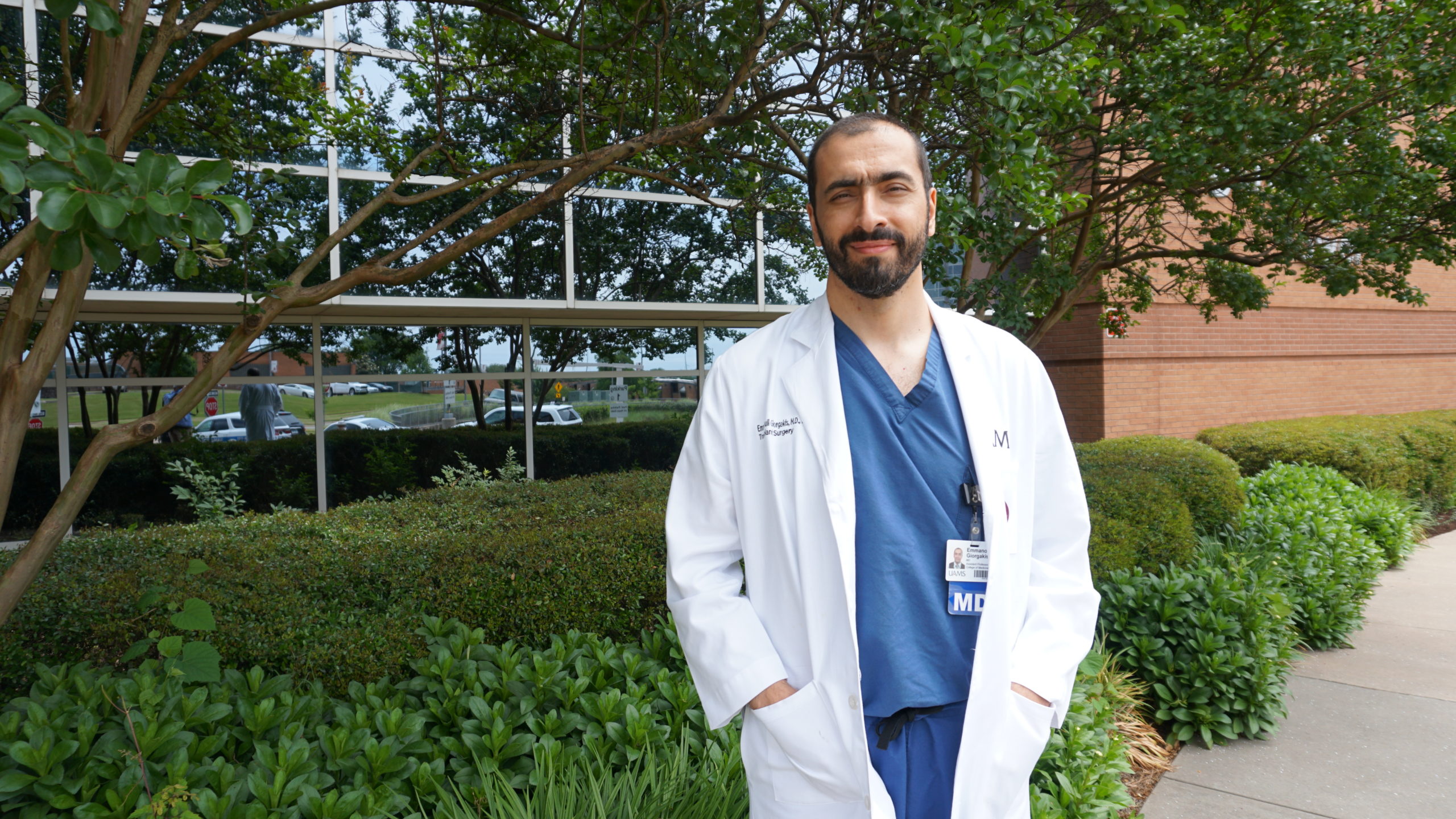View Larger Image

Transplant surgeon Emmanouil (Manos) Giorgakis, M.D., led UAMS' participation in a global study on the effects of surgery on patients with COVID-19. The findings were published in The Lancet.
Image by David Robinson
UAMS Contributes to Global Study Published in Lancet on Lung Complications for COVID-19 Patients Undergoing Surgery
| COVID-19 patients who underwent surgery were more likely to develop lung complications or die compared to those without COVID-19 in an international study that included the University of Arkansas for Medical Sciences (UAMS) as a collaborating partner.
Because of this heightened risk, the threshold for surgery should be higher during the pandemic, with consideration given to postponing non-critical procedures when possible, especially in men with multiple conditions aged 70 and older, the report concluded.
The findings were published in The Lancet, one of the most widely respected medical journals in the world. UAMS contributed data through the international COVIDSurg Collaborative (https://globalsurg.org/covidsurg/), based in the United Kingdom and with participants from 69 countries.
“COVID-19 is still new and some of its implications for medical treatment remain unknown,” said Emmanouil (Manos) Giorgakis, M.D., a transplant surgeon and assistant professor in the UAMS College of Medicine Division of Transplant Surgery who led UAMS’ participation in the study. “Doctors need more information to make informed decisions about patient care during the COVID-19 pandemic. This study is an important first step toward developing a deeper understanding of how we can best and most safely treat surgical patients.”
This analysis “Mortality and Pulmonary Complications in Patients Undergoing Surgery with Perioperative SARS-CoV-2 Infection: An International Cohort study,” included 1,128 patients. Giorgakis said a follow-up report is underway. “Another important thing to point out in this study is that only one in four were known to be COVID-19 positive before surgery. The rest were diagnosed afterward, but faced similar risks,” Giorgakis said. “This is yet another argument for the importance of screening and testing potential surgery patients before they have procedures, as is the policy at UAMS and in Arkansas.”
Specifically, the analysis provided a snapshot of the surgical patients diagnosed with COVID-19 between Jan. 1 and March 31. Lung complications like pneumonia or acute respiratory distress syndrome occurred in 51% of the patients, and 23% of COVID-19 positive patients died within 30 days.
Among the patients who developed lung complications, 38% died in 30 days. Identified risk factors were male gender, patients over age 70, patients undergoing major and/or non-elective surgery, and patients with several conditions such as cardiac or peripheral vascular disease, COPD, metabolic syndrome or patients with cancer.
For comparison, Giorgakis said that before the COVID-19 pandemic, about 10% of surgery patients would develop lung complications after surgery and the overall death rate related to postoperative pulmonary complications is 2-3%.
Additional UAMS study collaborators are Avi Bhavaraju, M.D.; Kyle Kalkwarf, M.D.; Matthew Roberts, M.D.; Ronald Robertson, M.D.; Melissa R. Kost, M.D.; Mary K. Kimbrough, M.D.; Benjamin L. Davis, M.D.; Jonathan Laryea, M.D.; and Lyle Burdine, M.D., Ph.D.
Giorgakis is also the UAMS site lead investigator for the CovidSurg – Cancer study, which aims to give better evidence-based guidelines for making decisions about cancer care during the COVID-19 pandemic, and the International COVID-19 Transplant Registry. The CovidSurg Network includes 78 countries, with 950 centers and more than 32,000 patients enrolled, making it one of the largest studies in surgery of all time, Giorgakis said.
Funding for the study came from the National Institute for Health Research (NIHR) in the United Kingdom, Association of Coloproctology of Great Britain and Ireland, Bowel and Cancer Research, Bowel Disease Research Foundation, Association of Upper Gastrointestinal Surgeons, British Association of Surgical Oncology, British Gynaecological Cancer Society, European Society of Coloproctology, NIHR Academy, Sarcoma UK, Vascular Society for Great Britain and Ireland, and Yorkshire Cancer Research.
This project was supported by the UAMS Translational Research Institute, which is supported by the National Center for Advancing Translational Sciences (NCATS) at the National Institutes of Health, grant UL1TR003107.
UAMS is the state’s only health sciences university, with colleges of Medicine, Nursing, Pharmacy, Health Professions and Public Health; a graduate school; a hospital; a main campus in Little Rock; a Northwest Arkansas regional campus in Fayetteville; a statewide network of regional campuses; and eight institutes: the Winthrop P. Rockefeller Cancer Institute, Jackson T. Stephens Spine & Neurosciences Institute, Harvey & Bernice Jones Eye Institute, Psychiatric Research Institute, Donald W. Reynolds Institute on Aging, Translational Research Institute, Institute for Digital Health & Innovation and the Institute for Community Health Innovation. UAMS includes UAMS Health, a statewide health system that encompasses all of UAMS’ clinical enterprise. UAMS is the only adult Level 1 trauma center in the state. UAMS has 3,485 students, 915 medical residents and fellows, and seven dental residents. It is the state’s largest public employer with more than 11,000 employees, including 1,200 physicians who provide care to patients at UAMS, its regional campuses, Arkansas Children’s, the VA Medical Center and Baptist Health. Visit www.uams.edu or uamshealth.com. Find us on Facebook, X (formerly Twitter), YouTube or Instagram.###